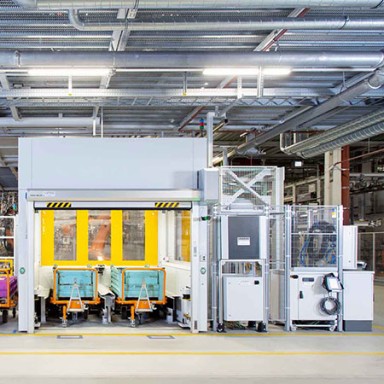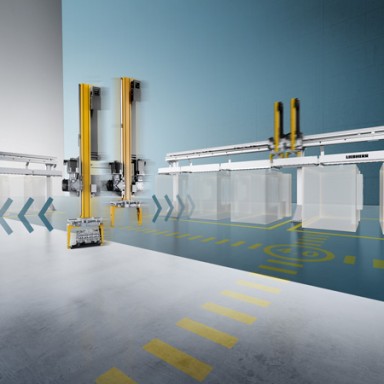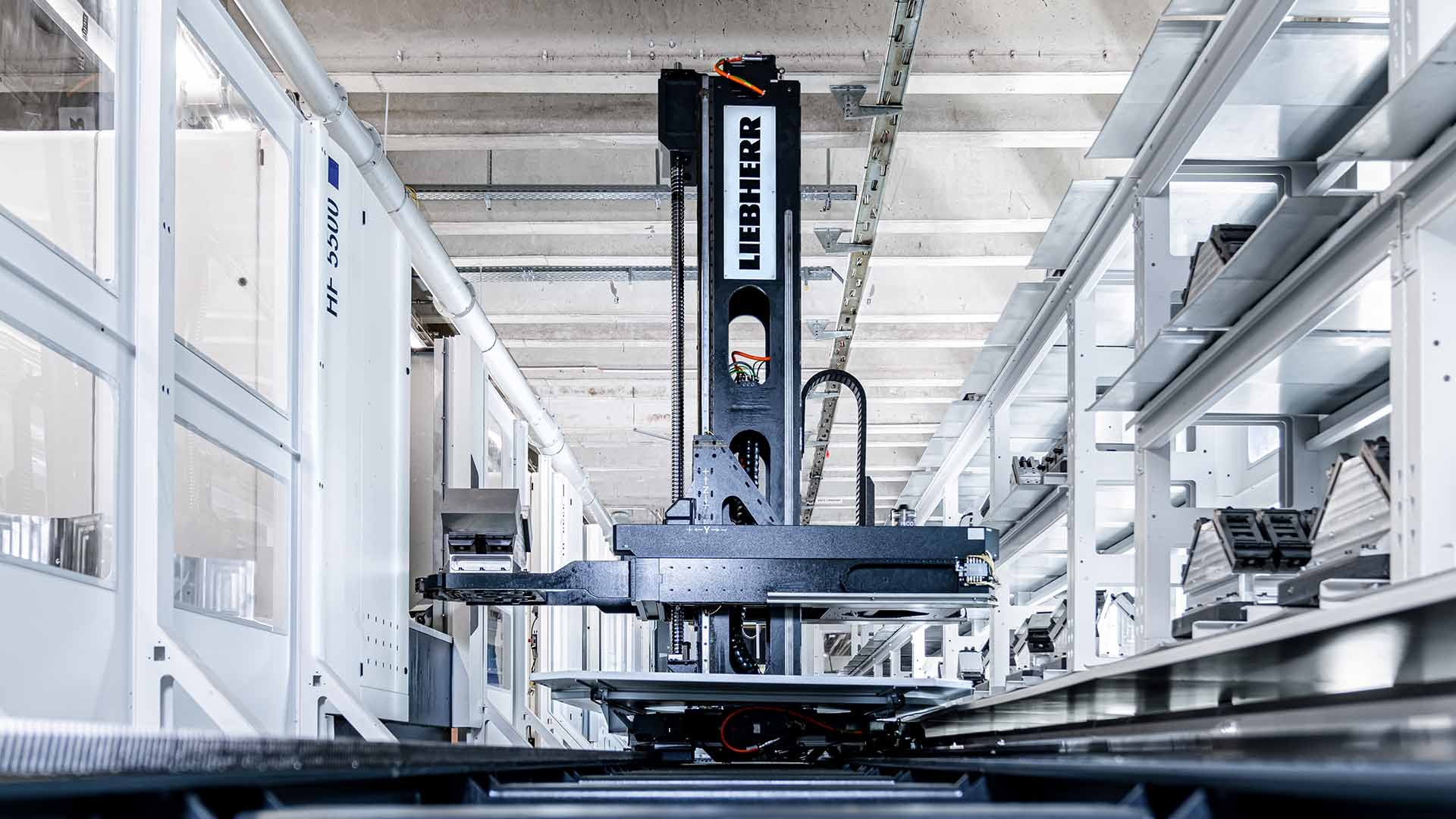
Throughput times reduced by 75 %
At the Teisnach plant of the Rohde & Schwarz technology group, the PHS 1500 Allround pallet handling system from Liebherr-Verzahntechnik GmbH automates four HF 5500 5-axis machining centers from Heller. This has not only made it possible to integrate a wide variety of parts on an interlinked production system, but has also significantly reduced part throughput times.
Rohde & Schwarz develops, produces and markets a wide range of electronic capital goods for industry, infrastructure operators and government customers. The independent group is among the technology and market leaders in its field, including wireless communications and RF measurement technology, broadcast and media technology, professional radiocommunications, cybersecurity and network technology. The Teisnach plant is the mechatronics center in the Rohde & Schwarz group. Its products include enclosures, shielding components, antennas, printed circuit boards, micromechanical precision parts and all types of custom electromechanical products. As a center of excellence for transmitters and systems, the plant manufactures, supplies and services broadcast transmitters and safety viewing panels, as well as customer-specific wireless communication systems.
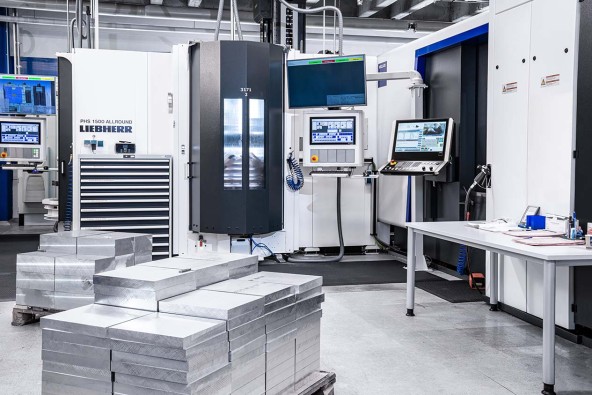
Setup station and control system for the machining center
5-axis machining of complex aluminum parts
Production at the plant takes place in three shifts and – when demand is highest – up to 19 shifts per week. For the machining of complex aluminum components in the Teisnach plant, Rohde & Schwarz chose four 5-axis machining centers from the CNC machine tool manufacturer Heller in Nürtingen, whose machining solutions are already widely used by the company. The HF 5500 is a powerful 5-axis machining center with the fifth axis “in the workpiece” for horizontal milling and has space for large clamping fixtures and workpieces as well as long travel ranges. With the combination of a robust machine bed, the horizontal spindle and an NC swivel rotary table with counter bearing and AB kinematics with highly dynamic torque drives, the powerful machine cuts the workpieces with precision and flexibility.
Automation solution with PHS 1500 Allround
In order to optimize the throughput times of the components with a wide variety of parts in small to medium batch sizes, the four machining centers were to be automated and controlled via a master computer. The greatest challenge here was the low ceiling height of the Rohde & Schwarz production hall in the Teisnach plant: as many storage locations as possible had to be accommodated at a height of less than four meters – a job for the PHS Allround pallet handling system from Liebherr, which, thanks to its modular concept, can be perfectly adapted to the requirements and space conditions of the company in question. For this reason – and because of the positive experience Heller had already had with automation solutions from Liebherr – the partners put together a complete package comprising Heller machines and the Liebherr PHS 1500 Allround.
Rhode & Schwarz
Plant Teisnach
Sector:
Electronic investment goods
Company headquarters:
Munich
Employees:
2,000 at the Teisnach site
12,300 in the company
Founded:
1969 Teisnach plant
1933 company
Website:
Simple integration of the master computer
Another criteria was that the existing host computer system at Rohde & Schwarz should be compatible with the automation system. Christian Heiler, in charge of quotation and project management for automation at Heller, recalls: “Perfect interface definition and coordination was an important part of the quotation phase. The customer already had a system with Soflex control in successful operation and wanted an automation solution that could be easily integrated.” Here, too, Liebherr was a perfect match as Soflex is one of two master computer suppliers with which Liebherr has been working for many years. The software ensures an overview of all resources and enables optimum planning of production orders, for example through prioritization and strategies for manned and unmanned automatic operation.
The PHS Allround – modular and space-saving
The PHS Allround is a space-saving, flexible and expandable manufacturing system that automatically supplies machine tools with ready-equipped machine pallets. It reduces downtimes through setup during the machining process, and the shelf magazine allows unmanned production for long periods of time. A rotatable and swiveling lift module also allows the loading of inclined shelves or machines. During the development of the system, particular attention was paid to ensuring that it is also suitable for low ceiling heights.
“This meant that the PHS 1500 Allround was basically tailor-made for us. That would have been difficult to implement with other systems,” recalls Georg Kauschinger, head of horizontal machining at Rohde & Schwarz in the Teisnach plant. “Initially, even Liebherr was skeptical about whether the system would fit in the hall,” he adds with a laugh.
Sizes of the PHS Allround
| PHS 800 Allround | PHS 1500 Allround | PHS 3000 Allround | |
| Max. transport weight | 800 kg | 1,500 kg | 3,000 kg |
| Max. transport weight with double loader option | 2 x 600 kg | 2 x 1,200 kg | Not available |
| Max. collision circle diameter* | ø 600 mm / ø 900 mm | ø 900 mm / ø 1,400 mm | ø 1,400 mm / ø 1,700 mm |
| Max. machine pallet size | 400 x 400 mm / 630 x 630 mm | 630 x 630 mm / 800 x 800 mm | 800 x 800 mm / 1,000 x 1,000 mm |
| Shelf levels | 2 to 3 | 2 to 3 | 2 to 3 |
| Max. workpiece height (incl. pallet) | 1,200 mm (2 shelf levels) | 1,200 mm (2 shelf levels) | 1,600 mm (2 shelf levels) |
| * The collision circle diameter designates the maximum permitted deviations of the machine pallet, including workpiece clamping and workpiece. | |||
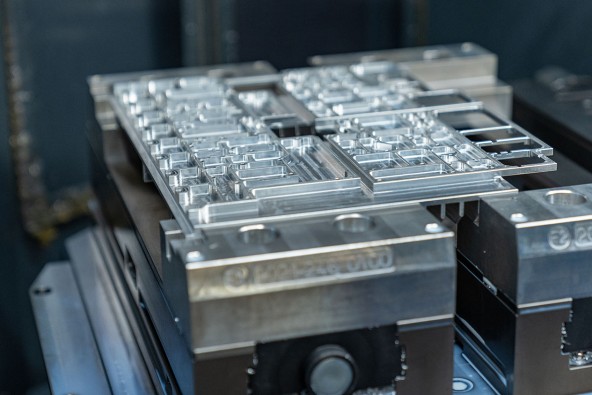
Fast throughput times even for complex components
PHS 1500 Allround as a productivity booster
During 2019, three of the four Heller machining centers were commissioned in succession. During the delivery of the second machine, the PHS 1500 Allround was also installed and the machines were operated automatically for the first time. The fourth machine followed in 2020, which means the system now consists of four 5-axis machining centers and two setup stations, one of which is rotatable. A generous parts nest for 70 machine pallets on three shelf levels makes the system highly autonomous. The machines do not have to be constantly attended to, and low-manpower production is possible. While systems without a pallet handling system require one person per machine and shift for operation, the interlinked machines require significantly fewer: personnel deployment is around 40 % less than for non-interlinked machines.
The production orders are now transferred with information on batch size and final due date to the Soflex master control system via the ERP interface and no longer have to be entered manually. Tool data is also now transmitted automatically from the tool data management system to the machine via the master computer using a data matrix code and a unique ID. Tool data no longer has to be manually entered at the machine. With the connection to the ERP system, production control has been optimized so that the throughput time for components is now only six to eight days – instead of 30 to 35 days as previously. At the same time, spindle running times are 10 % higher.
Rapid availability of spare parts
Another important criterion for selecting the automation solution was the rapid availability of spare parts. Based on personal contact and Liebherr’s references, it was quickly clear that the customer had found a long-term partner for spare parts supply and maintenance in the Kempten-based company. “However, the system has been running so smoothly so far that we haven’t actually had to use the service yet,” says Kauschinger. “At the beginning, we used Liebherr’s remote support for some minor problems, which were solved in an uncomplicated manner and within a very short time.”
Liebherr has mechanical engineering in their blood. Whether it’s in gear technology or automation – you can clearly see it in their products, advice and project processes.
Excellent cooperation on the project
“The most important thing was to have an established contact person at each of the companies involved and to be able to rely on the support of the suppliers at any time,” emphasizes Kauschinger. “On our visits to Kempten, we were advised and taught about all the details and felt very well informed. This was where it became clear to us that Liebherr, as a down-to-earth family business, is a reliable partner that stands for solid German mechanical engineering.” Christian Heiler adds with a smile, “Liebherr has mechanical engineering in their blood. Whether it’s in gear technology or automation – you can clearly see it in their products, advice and project processes.”
Addition of an automated setup station
It is intended to expand the system in future with an automated setup station that feeds the unmachined parts into the system via a robot. An automated bin picking solution will also be included in the considerations. “Based on the experience we gained in this project, Liebherr would certainly be our first choice to bring on board for another automation solution,” says Kauschinger, describing their growing trust.
A showcase system
The solution dispelled any reservations the company might have had about an interlinked plant. Georg Kauschinger’s summary is clear: “The system is also an impressive showcase. The key figures such as throughput times are genuine milestones. The success of the project is measurable.”

